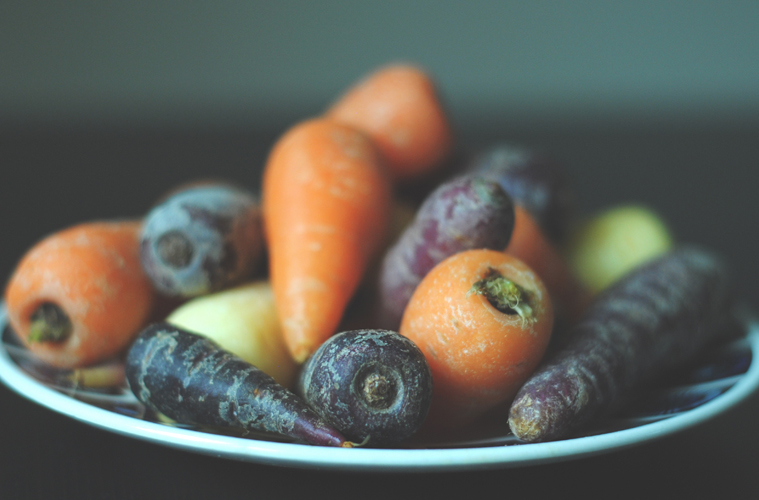In case you’ve been busy setting up your winter capsule, I’ve got a treat for you!
Leesa, who you might recognize from the very first Mini Capsule, shares with us her recommendations of 5 foods to eat in winter! If you’ve been wondering what to add to your capsule to make it suit the season, these tips are a wonderful guide.
Enjoy!
Winter is a time to shift to a more warming, easily digested menu. Our bodies are working harder to keep us warm and to fight off the winter colds and flus. Instead of cold, raw foods such as salads and green smoothies, it is time to focus on more warming foods that will support the metabolism and blood circulation. They provide key immune system nutrients and help keep us healthy through the colder months.
Soups and Stews
This is a winter menu staple. There’s nothing more nourishing and fortifying than a lovely slow cooked soup or stew. It’s the perfect way to nourish your body during the colder months: Filled with warming, easily digested foods, high in immune-boosting nutrients, natural antibiotics and pre-biotic fibre that keep your gut healthy.
Build your own perfect slow-cooked winter warmer with your favourite elements:
- onion, leek, garlic, celery, ginger, turmeric
- root vegetables: carrot, potato (look for different coloured varieties of these for additional nutrients), pumpkin, turnip, parsnip, jerusalem artichoke
- protein: lamb, beef, chicken, legumes
- optional: grains such as barley, rice, wheat berries or pasta/ couscous
- if you have it, some homemade stock or broth really ups the taste and nutrient quota!
- add some anti-bacterial herbs and spices such as thyme, oregano and cloves to really boost the therapeutic value of your creation!
root vegetables
Mother nature really knows what she’s doing when it comes to seasonal foods. The abundance of colourful root vegetables in winter is a great example. These foods are rich in nutrients such as vitamin A, vitamin C and Vitamin B6, all of which contribute to optimal immune function and help protect your airways and lungs from infection.
These vegetables love being roasted or added to slow cooked soups and stews, making them warming and easily digested. Also try them as a warm salad with some rocket, pine nuts and feta or goats cheese for a delicious lunch. Be sure to always cook (or serve) your root veggies with some extra virgin olive oil or butter/ghee, to ensure the nutrients are absorbed in your digestive tract.
stewed winter fruit
Fruit is often more of a feature in summer menus, so it’s great to add in some of the benefits of these little nutrient powerhouses in the winter months. In keeping with the focus on warming, easily digested foods, winter fruits take really well to light stewing or baking with some warming spices like cinnamon, ginger and nutmeg.
Stewed apples are soothing to the digestive tract (making them a great option for any unwell kids (and adults!). Pears are known in traditional Chinese medicine to be supportive for the lungs and especially persistent dry coughs.
pimped-up oats
Warm breakfasts are definitely recommended in the colder weather and oats can be the perfect way to start the day. With a few simple additions you can build a nourishing, tasty and satisfying breakfast that will keep you going on those frosty winter mornings:
- start with a base of whole oats and simmer with water or your favourite milk.
- add some grated apple or pear
- include some almond meal, chia seeds, flax meal (or LSA) for a protein and fatty acid boost
- mix in a touch of cinnamon, vanilla or your favourite chai spice blend and
- finish off with a dollop of natural yoghurt
This combination gives you a beautiful synergy of protein, fat and carbohydrates. It’s full of beneficial fibres to support digestive health, and warming spices to stimulate your circulation and digestion. Add a bit of your favourite sweetener if you like – we usually go for maple syrup or brown sugar :).
herbal teas
Not really a food, but something I find is a really great addition to the winter diet for a couple of reasons:
- We tend to struggle more with staying hydrated in the colder months – sipping on cold water just loses its appeal when the temperature drops! Having a few cups of herbal tea during the day contributes to your water intake and helps warm you up.
- You can take advantage of the beautiful therapeutic benefits offered by different herbs.
Sipping on elderberry and elderflower tea helps protect against (and can shorten the duration of) colds and flu.
Chamomile and passionflower make a beautiful calming after-dinner brew to help you get a good night’s sleep.
Ginger and peppermint can be great to have after meals if you suffer from any digestive upsets.
________________________________________________________________
 Leesa is a practising Naturopath and Holistic Nutritionist with her practise in Camberwell, Melbourne. She stands for Wellness, Simplified and strives to help putting an end to the endless stream of conflicting information about health, nutrition and diets so you can experience the freedom that comes with understanding what your body needs.
Leesa is a practising Naturopath and Holistic Nutritionist with her practise in Camberwell, Melbourne. She stands for Wellness, Simplified and strives to help putting an end to the endless stream of conflicting information about health, nutrition and diets so you can experience the freedom that comes with understanding what your body needs.
You can check out her website here.
cover photo by Hello I’m Nik on Unsplash

